Format results
-
14 talks-Collection NumberC24037
Talk
-

Lecture - Relativity, PHYS 604
Ghazal Geshnizjani Perimeter Institute for Theoretical Physics
-

Lecture - Relativity, PHYS 604
Ghazal Geshnizjani Perimeter Institute for Theoretical Physics
-

Lecture - Relativity, PHYS 604
Ghazal Geshnizjani Perimeter Institute for Theoretical Physics
-

Lecture - Relativity, PHYS 604
Ghazal Geshnizjani Perimeter Institute for Theoretical Physics
-

Lecture - Relativity, PHYS 604
Ghazal Geshnizjani Perimeter Institute for Theoretical Physics
-

Lecture - Relativity, PHYS 604
Ghazal Geshnizjani Perimeter Institute for Theoretical Physics
-

Lecture - Relativity, PHYS 604
Ghazal Geshnizjani Perimeter Institute for Theoretical Physics
-

Lecture - Relativity, PHYS 604
Ghazal Geshnizjani Perimeter Institute for Theoretical Physics
-
-
Statistical Physics (Core), PHYS 602, October 7 - November 6, 2024
14 talks-Collection NumberC24033Talk
-
Quantum Field Theory I (Core), PHYS 601, October 7 - November 6, 2024
13 talks-Collection NumberC24034Talk
-

Lecture - QFT I, PHYS 601
Gang Xu Perimeter Institute for Theoretical Physics
-

Lecture - QFT I, PHYS 601
Gang Xu Perimeter Institute for Theoretical Physics
-

Lecture - QFT I, PHYS 601
Gang Xu Perimeter Institute for Theoretical Physics
-

Lecture - QFT I, PHYS 601
Gang Xu Perimeter Institute for Theoretical Physics
-

Lecture - QFT I, PHYS 601
Gang Xu Perimeter Institute for Theoretical Physics
-

Lecture - QFT I, PHYS 601
Gang Xu Perimeter Institute for Theoretical Physics
-

Lecture - QFT I, PHYS 601
Gang Xu Perimeter Institute for Theoretical Physics
-

Lecture - QFT I, PHYS 601
Gang Xu Perimeter Institute for Theoretical Physics
-
-
Future Prospects of Intensity Interferometry
24 talks-Collection NumberC24046Talk
-

-

Intensity correlations: imaging and quantum optics in astrophysics
Robin Kaiser The French National Centre for Scientific Research
-

Intensity Interferometry with the H.E.S.S. telescopes
Naomi Vogel ECAP, FAU Erlangen-Nürnberg
-

Progress Toward Multi-Channel Intensity Interferometry with the Southern Connecticut Stellar Interferometer
Elliott Horch Southern Connecticut State University
-

-

The Multi Aperture Spectroscopic Telescope: Status and potential as an intensity interferometry facility
Sagi Ben Ami Weizmann Institute of Science
-

-

Future Astrophysical Targets for Intensity Interferometry
Norman Murray Canadian Institute for Theoretical Astrophysics (CITA)
-
-
Classical Physics (Core), PHYS 776, September 3 - October 4, 2024
15 talks-Collection NumberC24031Talk
-

Lecture - Classical Physics, PHYS 776
Aldo Riello Perimeter Institute for Theoretical Physics
PIRSA:24090001 -

Lecture - Classical Physics, PHYS 776
Aldo Riello Perimeter Institute for Theoretical Physics
PIRSA:24090002 -

Lecture - Classical Physics, PHYS 776
Aldo Riello Perimeter Institute for Theoretical Physics
PIRSA:24090003 -

Lecture - Classical Physics, PHYS 776
Aldo Riello Perimeter Institute for Theoretical Physics
PIRSA:24090004 -

Lecture - Classical Physics, PHYS 776
Aldo Riello Perimeter Institute for Theoretical Physics
PIRSA:24090005 -

Lecture - Classical Physics, PHYS 776
Aldo Riello Perimeter Institute for Theoretical Physics
PIRSA:24090006 -

Lecture - Classical Physics, PHYS 776
Aldo Riello Perimeter Institute for Theoretical Physics
PIRSA:24090007 -

Lecture - Classical Physics, PHYS 776
Aldo Riello Perimeter Institute for Theoretical Physics
PIRSA:24090008
-
-
Quantum Theory (Core), PHYS 605, September 3 – October 4, 2024
14 talks-Collection NumberC24036Talk
-

Lecture - Quantum Theory, PHYS 605
Bindiya Arora Perimeter Institute for Theoretical Physics
-

Lecture - Quantum Theory, PHYS 605
Bindiya Arora Perimeter Institute for Theoretical Physics
-

Lecture - Quantum Theory, PHYS 605
Bindiya Arora Perimeter Institute for Theoretical Physics
-

Lecture - Quantum Theory, PHYS 605
Bindiya Arora Perimeter Institute for Theoretical Physics
-

Lecture - Quantum Theory, PHYS 605
Bindiya Arora Perimeter Institute for Theoretical Physics
-

Lecture - Quantum Theory, PHYS 605
Bindiya Arora Perimeter Institute for Theoretical Physics
-

Lecture - Quantum Theory, PHYS 605
Bindiya Arora Perimeter Institute for Theoretical Physics
-

Lecture - Quantum Theory, PHYS 605
Dan Wohns Perimeter Institute for Theoretical Physics
-
-
Waterloo-Munich Joint Workshop
21 talks-Collection NumberC24002Talk
-

Opening Remarks
-
Sonya Gzyl Max Planck Institute of Quantum Optics
-
Timothy Hsieh Perimeter Institute for Theoretical Physics
-
-

-

-

Towards large-scale quantum simulations with trapped ions - Rajibul Islam
Kazi-Rajibul Islam Institute for Quantum Computing (IQC)
-

-

-

-

-
-
Causalworlds
63 talks-Collection NumberC24018Talk
-

-

Tutorial: Causal Inference Meets Quantum Physics
Robert Spekkens Perimeter Institute for Theoretical Physics
-

Counterfactual and Graphical Frameworks for Causal Modeling
Thomas Richardson University of Washington
-

-

Relating Wigner's Friend Scenarios to Nonclassical Causal Compatibility, Monogamy Relations, and Fine Tuning
Yìlè Yīng Perimeter Institute for Theoretical Physics
-

Modeling Latent Selection with Structural Causal Models
Leihao Chen University of Amsterdam, Korteweg-de Vries Institute for Mathematics
-

Zero Inflation as a Missing Data Problem: a Proxy-based Approach
Trung Phung Johns Hopkins Whiting School of Engineering
-

-
-
Perimeter Institute Graduate Students' Conference 2024
12 talks-Collection NumberC24041Talk
-

Everything that can be learned about a causal structure with latent variables by observational and interventional probing schemes
Marina Maciel Ansanelli Perimeter Institute for Theoretical Physics
PIRSA:24090191 -

-

-

Channel Expressivity Measures
Matthew Duschenes Perimeter Institute for Theoretical Physics
PIRSA:24090201 -

The g-function and defect changing operators from wavefunction overlap on a fuzzy sphere
Zheng Zhou Perimeter Institute for Theoretical Physics
PIRSA:24090190 -

Open Quantum On Lie Group: An Effective Field Theory Approach
Afshin Besharat University of Alberta
PIRSA:24090192 -

Photon Rings and Shadow Size for General Integrable Spacetimes
Kiana Salehi perimeter institute and university of Waterloo
PIRSA:24090193 -

-
-
Celestial Holography Summer School 2024
27 talks-Collection NumberC24028Talk
-

Lecture - Celestial Holography Ia
PIRSA:24070002 -

Lecture - Canonical a
PIRSA:24070003 -

Lecture - Celestial Holography Ib
PIRSA:24070004 -

Lecture - Amplitudes a
PIRSA:24070005 -

Vision Talk
PIRSA:24070006 -

Lecture - Celestial Holography IIa
PIRSA:24070007 -

Lecture - Canonical b
PIRSA:24070008 -

Lecture - Celestial Holography IIb
PIRSA:24070009
-
-
50 Years of Horndeski Gravity: Exploring Modified Gravity
46 talks-Collection NumberC24019Talk
-

-

-

Horndeski Gravity in Cosmology
Alessandra Silvestri Leiden University
-

How we rediscovered Horndeski gravity
Cedric Deffayet Institut d'Astrophysique de Paris
-

Black holes in Horndeski theories
Christos Charmousis The French National Centre for Scientific Research
-

Hi-COLA: Horndeski Goes Non-linear
Tessa Baker University of Portsmouth
-

Photon Rings and Shadow Size for General Axi-Symmetric and Stationary Integrable spacetimes
Kiana Salehi perimeter institute and university of Waterloo
PIRSA:24070086 -

Modified gravity getting to the one-point clustering statistics
Cora Uhlemann Bielefeld University
PIRSA:24070087
-
-
PSI 15th Anniversary Reunion
15 talks-Collection NumberC24022Talk
-

Welcome & Happy 15th Anniversary
PIRSA:24060001 -

-

-

Driving Quantum Readiness - An Innovation Perspective
Sonali Mohapatra National Quantum Computing Centre
PIRSA:24060004 -

My Non-Geodesic Career Trajectory: From Entrepreneurship to Data & AI Consulting
Alexandre Vincart-Emard Avanade Inc (Montreal)
PIRSA:24060005 -

Solid State Detectors for Low-Mass Dark Matter Searches
Miriam Diamond University of Toronto
PIRSA:24060006 -

-

Cohort Project Presentation - "Catching Up": Holography
PIRSA:24060008
-
-
Quantum Field Theory II (Core), PHYS 603, November 12 - December 11, 2024
14 talks-Collection NumberC24035This course introduces the functional integral formalism, the renormalization group, and non-abelian gauge theory. Additional topics may be covered as time allows. Instructor: Francois David / Gang Xu Students who are not part of the PSI MSc program should review enrollment and course format information here: https://perimeterinstitute.ca/graduate-courses -
Statistical Physics (Core), PHYS 602, October 7 - November 6, 2024
14 talks-Collection NumberC24033The aim of this course is to explore the main ideas of the statistical physics approach to critical phenomena. We will discuss phase transitions, using the ferromagnetic phase transition and the Ising model as our primary example, with particular emphasis on the renormalisation group approach. Instructor: Emilie Huffman / Maite Dupuis Students who are not part of the PSI MSc program should review enrollment and course format information here: https://perimeterinstitute.ca/graduate-courses -
Quantum Field Theory I (Core), PHYS 601, October 7 - November 6, 2024
13 talks-Collection NumberC24034The first half of the course explains why fields are desirable when quantum mechanics meets special relativity. The second half introduces different kinds of spinor fields and their interactions. Instructor: Gang Xu Students who are not part of the PSI MSc program should review enrollment and course format information here: https://perimeterinstitute.ca/graduate-courses -
Future Prospects of Intensity Interferometry
24 talks-Collection NumberC24046
Recent advancements in photodetection technologies and spectroscopy hold the promise of transforming intensity interferometry, thereby revolutionizing observational Astronomy by enabling observations to resolve significantly fainter objects than currently possible. This workshop serves as a platform to unite experts in photodetection, theoretical and observational astronomy, as well as observers and theorists from diverse disciplines, to explore the multifaceted capabilities of intensity interferometry.
The workshop's focus spans three key objectives:
- Develop and disseminate novel ideas concerning science cases unique to intensity interferometry.
- Synthesize insights from observers and photodetector experts concerning the requisite technologies and experimental techniques which will allow for new science with intensity interferometry.
- Initiate a concentrated effort to propel the development of large telescope arrays dedicated to intensity interferometry.
This workshop will be exclusively organized in plenary sessions, providing ample time for engaging discussions among participants.
Scientific Organizers
Masha Baryakhtar - University of Washington
Neal Dalal - Perimeter Institute
Marios Galanis - Perimeter Institute
Junwu Huang - Perimeter Institute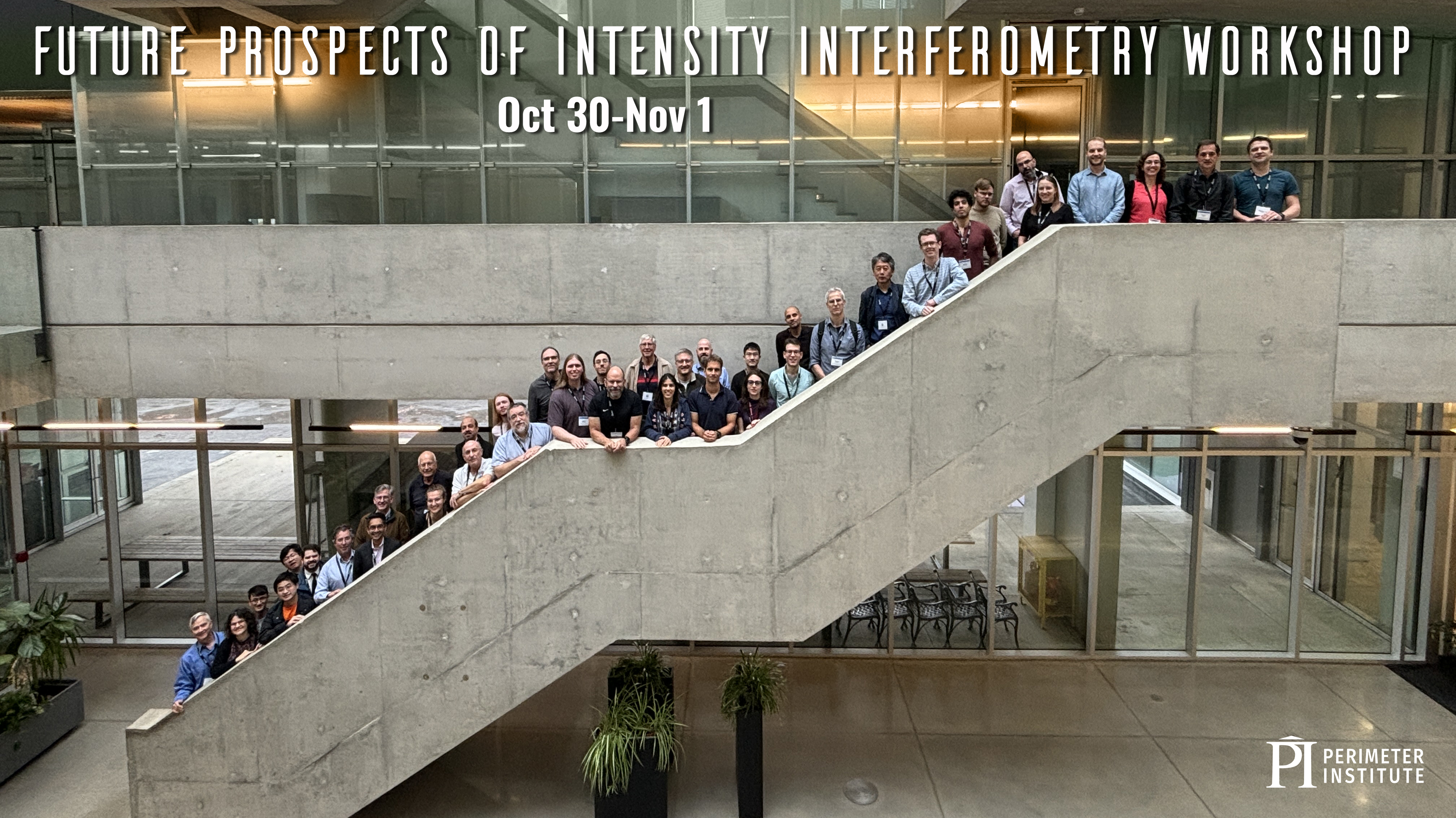
-
Classical Physics (Core), PHYS 776, September 3 - October 4, 2024
15 talks-Collection NumberC24031This is a theoretical physics course that aims to review the basics of theoretical mechanics, special relativity, and classical field theory, with the emphasis on geometrical notions and relativistic formalism, thus setting the stage for the forthcoming courses in Quantum Mechanics, and Quantum Field Theory in particular, as well as in General Relativity and Quantum Gravity. Instructor: Aldo Riello Students who are not part of the PSI MSc program should review enrollment and course format information here: https://perimeterinstitute.ca/graduate-courses -
Quantum Theory (Core), PHYS 605, September 3 – October 4, 2024
14 talks-Collection NumberC24036The aim of the first part is to present a brief overview of selected topics in quantum theory. Schrodinger, Heisenberg and Interaction picture is discussed and applied to study time evolution. Density matrix and Feynman path integral are introduced. The second part of the course derives the Feynman rules for scalar quantum field theory and introduces renormalization. Instructor: Bindiya Arora / Dan Wohns Students who are not part of the PSI MSc program should review enrollment and course format information here: https://perimeterinstitute.ca/graduate-courses -
Waterloo-Munich Joint Workshop
21 talks-Collection NumberC24002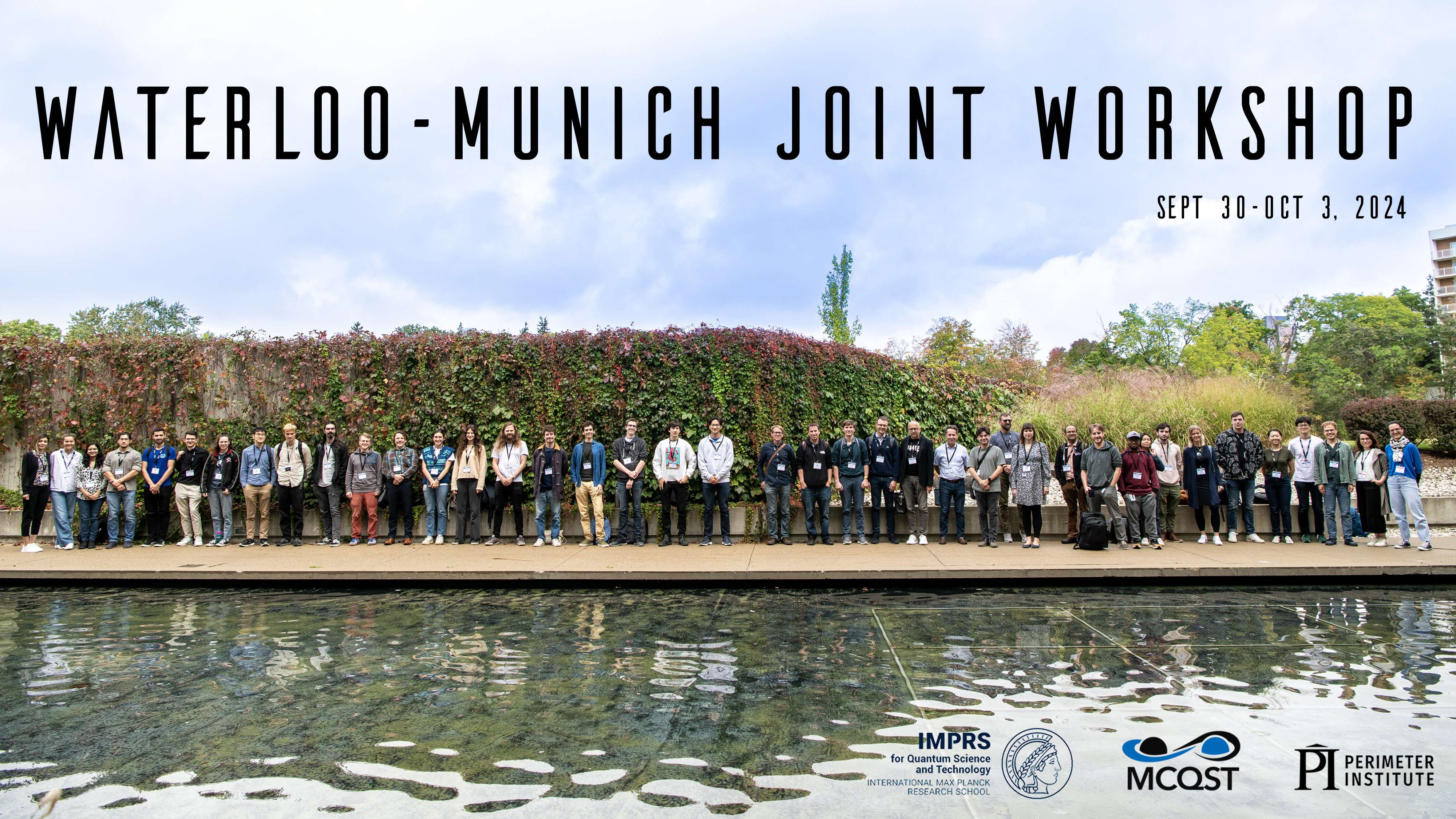
Join us for a pioneering joint workshop between renowned research institutions in Munich and Waterloo! This exciting event will focus on the topic of quantum simulation, with additional talks delving into various subjects of quantum science and technology. Designed to include researchers across different levels, from group leaders, postdoctoral fellows, and PhD students, this inaugural collaboration aims to unite scientists from both locations, fostering valuable networking opportunities and promoting interdisciplinary collaboration. Don't miss this extraordinary opportunity to connect, exchange ideas, and shape the future of quantum research together!

-
Causalworlds
63 talks-Collection NumberC24018Understanding causality is fundamental to science and inspires wide-ranging applications, yet there are several distinct notions of causation. Recently, there have been important developments on the role of causality in quantum physics, relativistic physics and their interplay. These have unearthed a plethora of fascinating open questions regarding the nature of causation, emergence of space-time structure and the limits of quantum information processing. At the same time, causal reasoning has become an important tool in machine learning and statistics, with applications ranging from big data to healthcare. This conference brings together experts from different areas of physics working on questions related to causality, as well as selected researchers who bridge the gap between fundamental research and current industrial applications. The aim of the conference is to provide a venue for cross-pollination of these ideas through scientific exchange between these communities. The conference will focus on the following facets of causality:
• Quantum and classical causal inference
• Indefinite causal order and quantum reference frames
• Causality in quantum field theory and quantum gravity
• Experiments and applications of causality

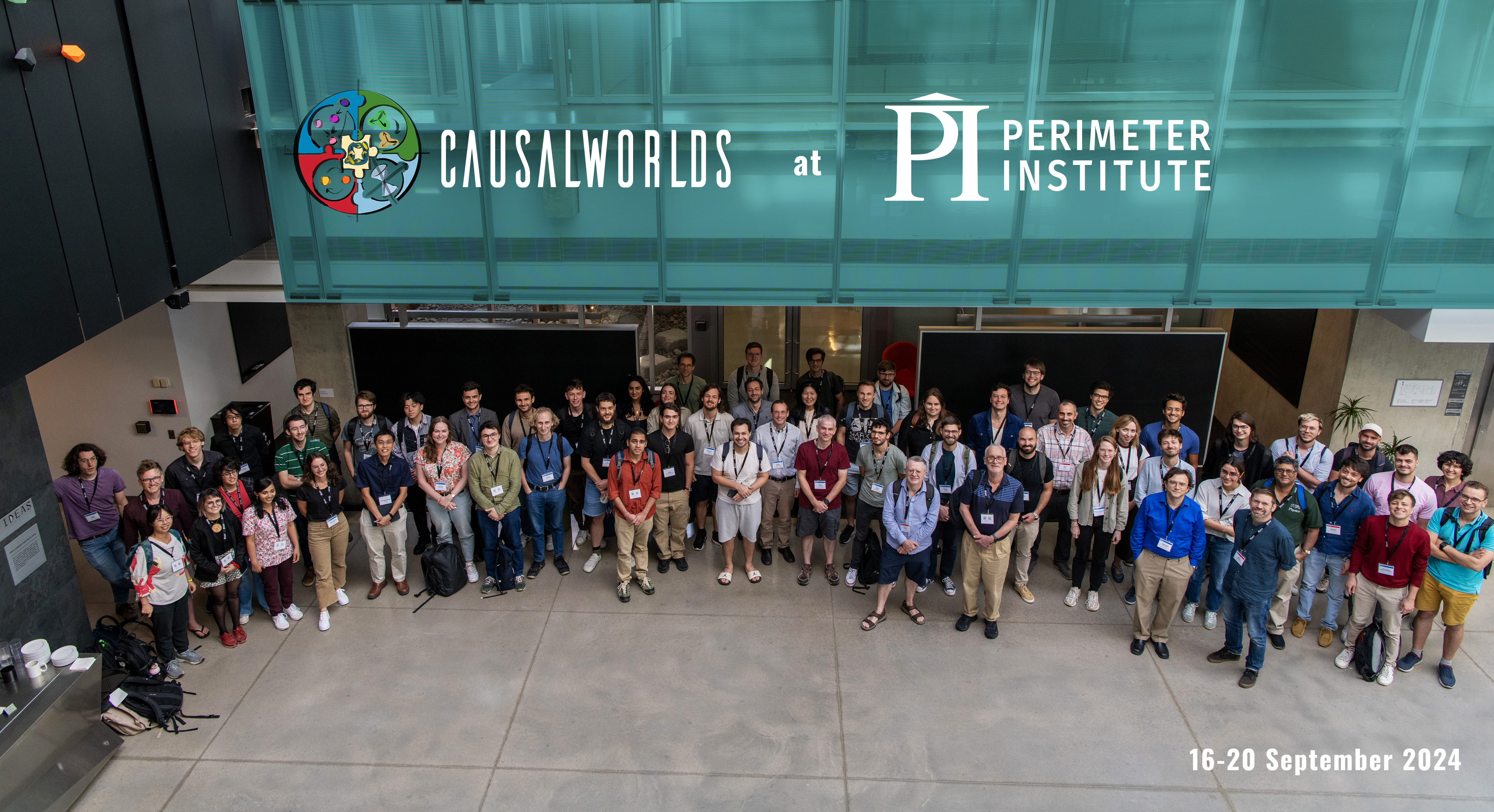
:: :: ::
Important dates
Paper submission deadline: 24 May 2024 // 31 May 2024
Paper notification: 3 July 2024 Registration deadline (with application for financial assistance): 18 July 2024
Registration deadline: 28 August 2024
Conference: 16-20 September 2024 Update: The submission deadline has been extended to 31st May 2024 for
papers which clearly justify their relevance for the following three
topics: 1) classical causal inference, 2) causality in relativistic physics (including quantum field theory and quantum gravity) and 3) experiments in causality. As we have received a sufficiently high number of submissions on the remaining topics (particularly indefinite causality and quantum causal models), the original deadline of 24th May still holds for submissions in this category. :: :: ::
Call for Abstracts
Prospective speakers can submit a paper for a contributed talk (in person or online) and/or a poster (in person only) via the Call for Abstracts. The Call for Abstracts is now open! Submissions for a talk will automatically be considered for a poster if not accepted for a talk.:: :: ::
Invited Speakers
Jessica Bavaresco (University of Geneva)
Cyril Branciard (CNRS, University Grenoble Alpes)
Rafael Chaves (Federal University of Rio Grande do Norte)
Giulio Chiribella (The University of Hong Kong)
Doreen Fraser (University of Waterloo)
Anne-Catherine de la Hamette (IQOQI Vienna)
Ciarán Lee (Spotify)
Tein van der Lugt (University of Oxford)
Joris M. Mooij (University of Amsterdam)
Mio Murao (University of Tokyo)
Alejandro Pozas-Kerstjens (University of Geneva)
Huw Price (Trinity College, Cambridge)
Renato Renner (ETH Zürich)
Thomas Richardson (University of Washington)
Sally Shrapnel (The University of Queensland)
Sumati Surya (Raman Research Institute)
Rainer Verch (University of Leipzig)
:: :: ::
Programme Committee
V Vilasini (ETH Zürich & Inria, University Grenoble Alpes) (PC Chair)
Augustin Vanrietvelde (Télécom Paris) (PC Co-chair)
Alastair Abbott (Inria, University Grenoble Alpes)
Časlav Brukner (IQOQI Vienna & University of Vienna)
Eric Cavalcanti (Griffith University)
Chris Fewster (University of York)
Lucien Hardy (Perimeter Institute)
Hlér Kristjánsson (Perimeter Institute & IQC & Université de Montréal)
Giulia Rubino (University of Bristol)
Nitica Sakharwade (Università degli Studi di Napoli Federico II)
Robert Spekkens (Perimeter Institute)
Jacopo Surace (Perimeter Institute)
Elie Wolfe (Perimeter Institute)
Lin-Qing Chen (ETH Zürich & IQOQI Vienna)
Hippolyte Dourdent (ICFO Barcelona)
Tamal Guha (University of Hong Kong)
Robin Lorenz (Quantinuum, Oxford)
Maria Papageorgiou (IQOQI Vienna)
Nicola Pinzani (Université libre de Bruxelles)
Marco-Túlio Quintino (Sorbonne Université, Paris)
Marc-Olivier Renou (Inria Paris-Saclay & CPHT, École polytechnique)
David Schmid (ICTQT, University of Gdańsk)
John Selby (ICTQT, University of Gdańsk)
Akihito Soeda (National Institute of Informatics, Tokyo)
Matthew Wilson (University College London)
:: :: ::
Scientific Organizers
Hlér Kristjánsson (Perimeter Institute & IQC & Université de Montréal) (Chair)
V Vilasini (ETH Zürich & Inria, University Grenoble Alpes)
Robert Spekkens (Perimeter Institute)
Lucien Hardy (Perimeter Institute)
Elie Wolfe (Perimeter Institute)
Jacopo Surace (Perimeter Institute)
Marina Maciel Ansanelli (Perimeter Institute)
Yìlè Yīng (Perimeter Institute)
María Ciudad Alañón (Perimeter Institute)
Daniel Centeno Díaz (Perimeter Institute)
Khushi Gandhi (Perimeter Institute & University of Waterloo):: :: ::
Previous editions:
Causalworlds 2022: The interface between quantum and relativistic causality, foundations and practicalities
Organised at ETH Zürich in 2022. Website: https://causalworlds.ethz.ch/" -
Perimeter Institute Graduate Students' Conference 2024
12 talks-Collection NumberC24041
The annual Graduate Students’ Conference showcases the diverse research directions at Perimeter Institute, both organized and presented by the students. Our graduate students are invited to share their best work with their fellow PhD students, PSI students and other PI residents interested in hearing about physics research and discussing it in a lively atmosphere full of questions.
PSI students are welcome to join as audience members on Friday, Sept 13 and to present a Lightning Talk if they wish to do so.
-
Celestial Holography Summer School 2024
27 talks-Collection NumberC24028Perimeter Institute is happy to host the inaugural summer school for the Simons Collaboration on Celestial Holography July 22-26 in Waterloo, ON. The program will feature lectures on background material relevant for graduate students and postdocs interested in this emerging subfield, paired with vision talks on exciting future research directions.
:: :: ::
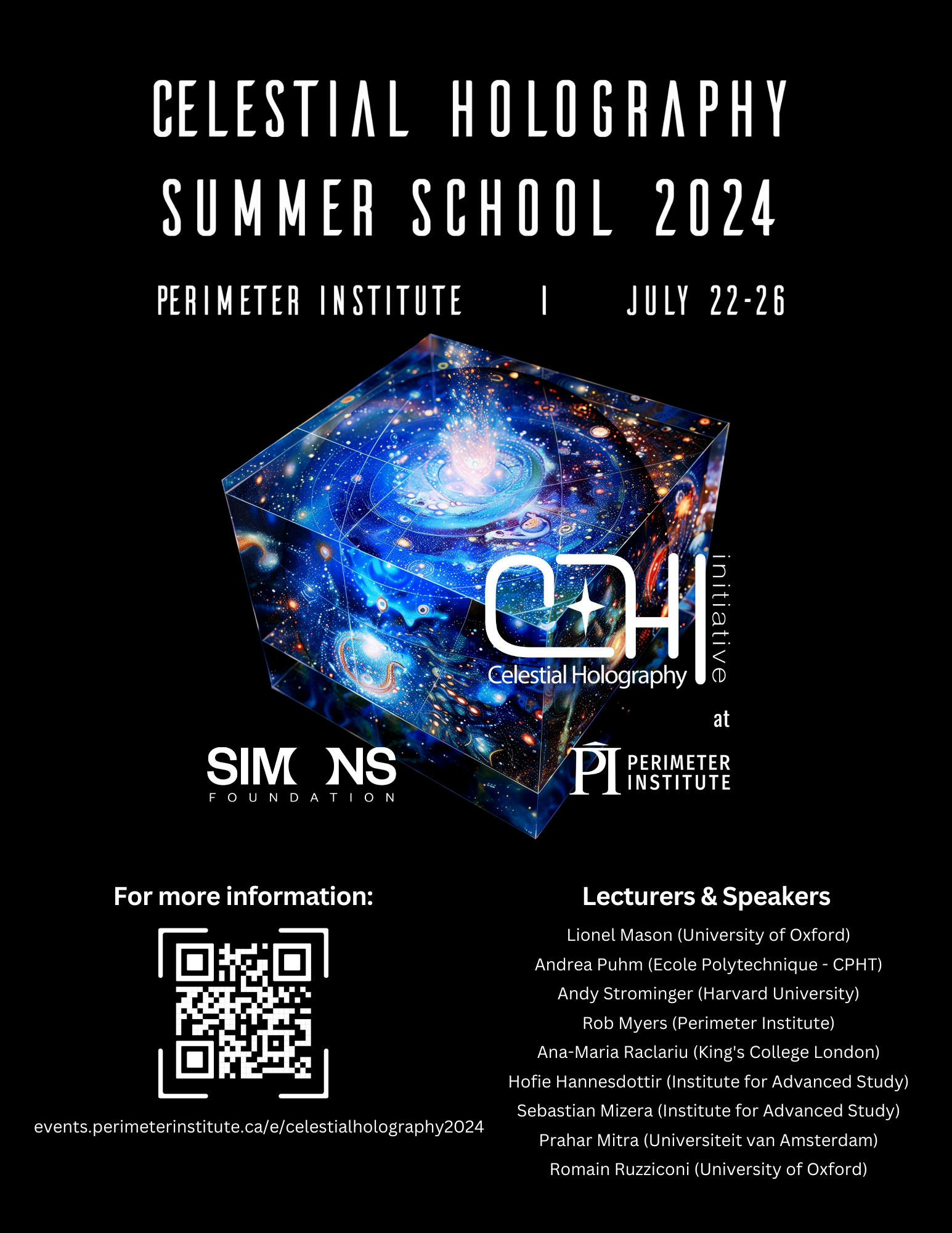
-
50 Years of Horndeski Gravity: Exploring Modified Gravity
46 talks-Collection NumberC24019
Recent years have seen a flood of new data, from gravitational wave observations of merging black holes and neutron stars to precision probes of cosmology, which allow for unprecedented tests of our understanding of gravity. Going hand-in-hand with this, there has been significant recent progress on the theoretical side in terms of formulating modified theories of gravity, and using them to make detailed predictions, including in the nonlinear and dynamical regime, which can be confronted with the observations.
We are excited to announce a landmark conference that plans to delve into the forefront of research on modified theories of gravity and brings together leading experts from different disciplines including observational astrophysicists, numerical relativists, cosmologists and mathematical physicists to explore the present status of modified theories of gravity and envision their future theoretical development and implications for observations.
This conference is also timed to coincide with the 50th anniversary of pioneering work in this area carried out by Gregory Horndeski in the Waterloo Mathematical Physics Community. Hosted jointly by Perimeter Institute and the University of Waterloo, this conference will serve as a forum for researchers from different disciplines to exchange ideas at the cutting
edge of gravitational physics.
Presented by:

Sponsored in part by Gravity Theory Trust
:: :: ::Topics:
• Modified Gravity Theories: Theoretical Framework and Models
• Tests of modified Gravity with Gravitational Waves (LIGO/LISA/PTA)
• Astrophysical/cosmological tests of gravity
• Mathematical structure of Modified gravity
• Observational tests of quantum gravity
• Modified gravity in the early universeConference Structure:
The conference will feature a balanced blend of plenary sessions (invited Speakers), contributed talks, panel discussions and poster presentations for students.
• Keynote presentations by renowned physicists in the field, discussing the impact of Horndeski theories and other modified theories of gravity on cosmology, dark energy, and black hole physics.
• Contributed talks: prioritizing early-career researchers
• Panel discussions on emerging research directions, unresolved questions, and potential applications of Horndeski theories.
• Poster sessions for early-career researchers and graduate students to showcase their work and receive feedback from senior scientists.:: :: ::
Scientific Organizers:
- Ghazal Geshnizjani (Perimeter Institute, SOC Chair)
- William East (Perimeter Institute)
- Levon Pogosian (Simon Fraser University, Perimeter Institute Affiliate)
- Niayesh Afshordi (Perimeter Institute, U Waterloo, LOC Chair)
- Will Percival (Perimeter Institute, U Waterloo)
- Florian Girelli (U Waterloo, Perimeter Institute Affiliate)
- Jerome Quintin (U Waterloo, Perimeter Institute)
- Alex Krolewski (U Waterloo, Perimeter Institute, CITA)
:: :: ::
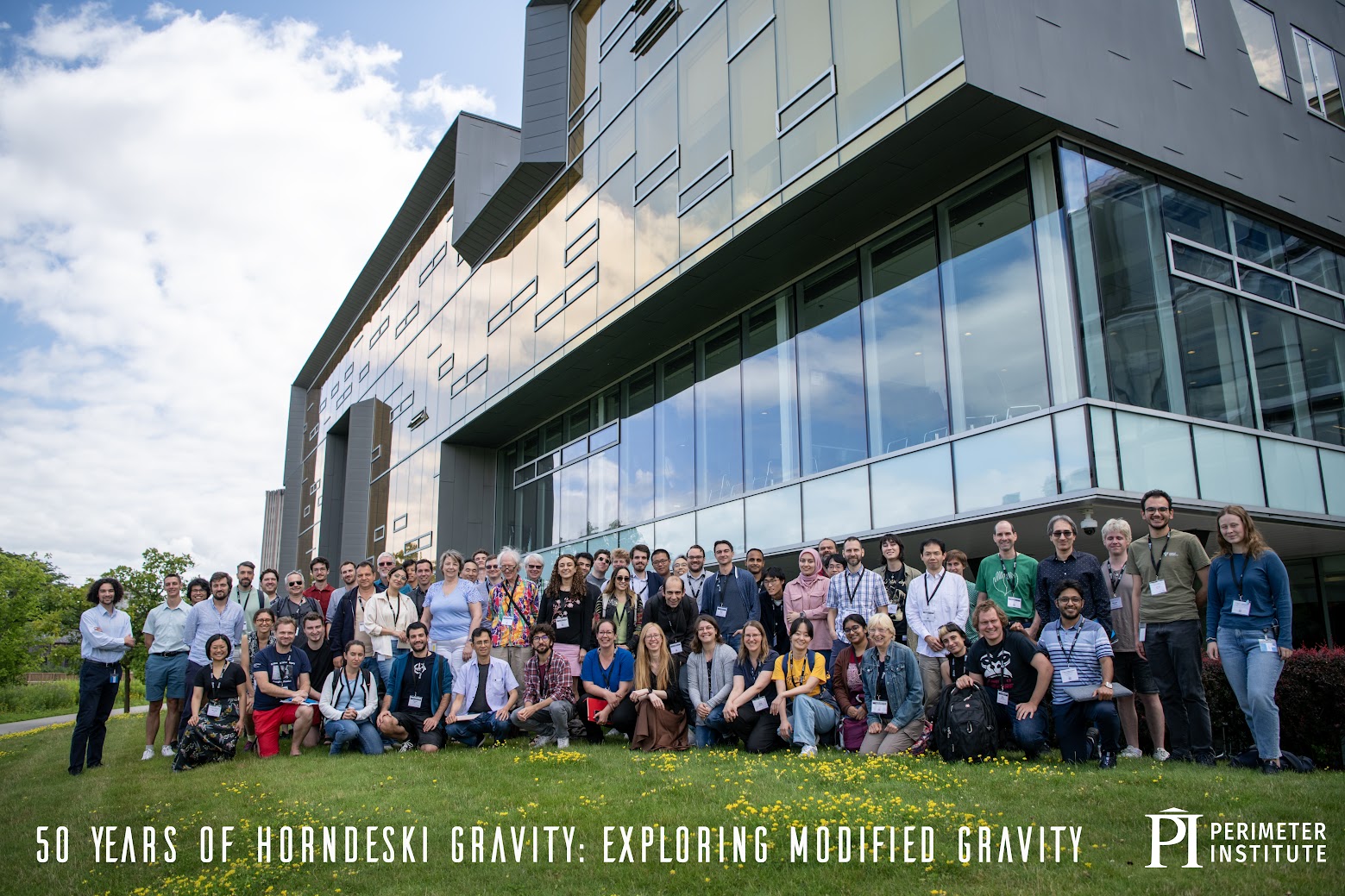
-
PSI 15th Anniversary Reunion
15 talks-Collection NumberC24022PSIons celebrate 15 years of Perimeter Scholars International with the first ever PSI reunion event!
Join us for 3 days that include:
- 3 former PSI Keynote Speakers in Industry
- 3 former PSI Speakers in Academia
- A chance to win 1 of 7 Grants of up to 5000 CAD each for a PSI class project to be developed and presented at the reunion (see Call for Projects for details)
- Social events with your cohorts and PSI special guests
- Lots of time to connect with classmates and PSIons, while immersing yourself in Perimeter’s lively research and collaboration environment.
_______________________________________________________
The Perimeter Scholars International (PSI) Master's program is offered in collaboration by Perimeter Institute and the University of Waterloo.
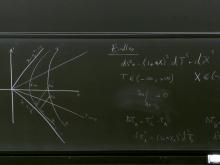
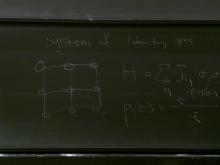








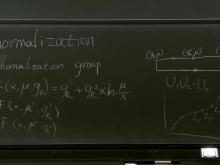
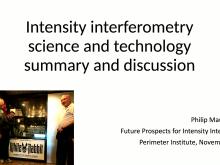
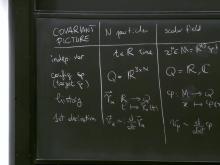
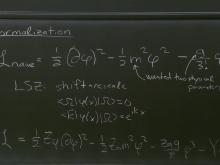
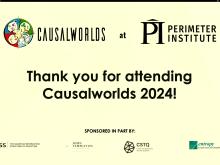

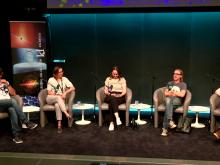
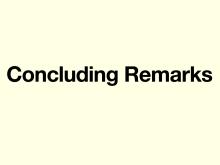
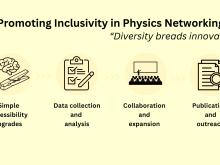
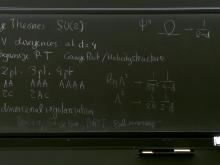








.png)